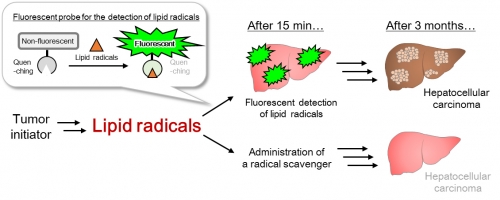研究成果 Research Results
- TOP
- News
- Research Results
- Lipid-derived radicals initiate liver cancer development
Lipid-derived radicals initiate liver cancer development
2016.06.14Research ResultsLife & Health
Lipids and their metabolites are easily oxidized in chain reactions initiated by lipid radicals, forming lipid peroxidation products. These markers for oxidative stress can bind cellular macromolecules, causing inflammation, apoptosis and other damage. Methods to detect and neutralize the initiating radicals would provide insights into disease mechanisms and new therapeutic approaches.
We describe the first high sensitivity, specific fluorescence probe for lipid radicals. This probe directly detected lipid radicals in living cells by turn-on fluorescence. In a rat model of hepatic carcinoma induced by diethylnitrosamine (DEN), probe detected lipid radical generation. The lipid radical inhibition decreased inflammation, apoptosis and oxidative stress markers, and liver tumor development after DEN. Thus, we have developed a novel fluorescence probe that provides imaging information about lipid radical generation and potential therapeutic benefits in vivo.
This research achievement has been published on June 13, 2016, Nature Chemical Biology, Fluorescence probes to detect lipid-derived radicals, DOI: 10.1038/nchembio.2105

We developed new florescence probe for the detection of lipid radicals. Also, we found that lipid radicals were critical contributors to initiation of liver cancer.
Journal Reference
Fluorescence probes to detect lipid-derived radicals, ,Nature Chemical Biology, 10.1038/nchembio.2105Research-related inquiries
- TOP
- News
- Research Results
- Lipid-derived radicals initiate liver cancer development































